Preventing Monopolies: A Case Study of TfL and UK Government
VerifiedAdded on 2020/01/23
|32
|9092
|211
Report
AI Summary
This report examines the UK government's effectiveness in preventing monopolies and curbing unfair practices, using Transport for London (TfL) as a case study. It begins by defining monopolies and unfair trade practices, exploring their merits and demerits, and then investigates the role of the government in regulating these behaviors in the UK market. The research includes an analysis of TfL's monopolistic position, its budget, and its impact on the transport system of Greater London. The report further delves into research methodologies, data analysis, and research findings, including the use of questionnaires to gather data. The analysis covers key aspects of the topic, including the meaning of monopolistic behavior, the role of government, and measures to prevent unfair trade practices. The conclusion summarizes the findings and provides recommendations for the government to prevent such practices, offering insights into market regulation and competition.
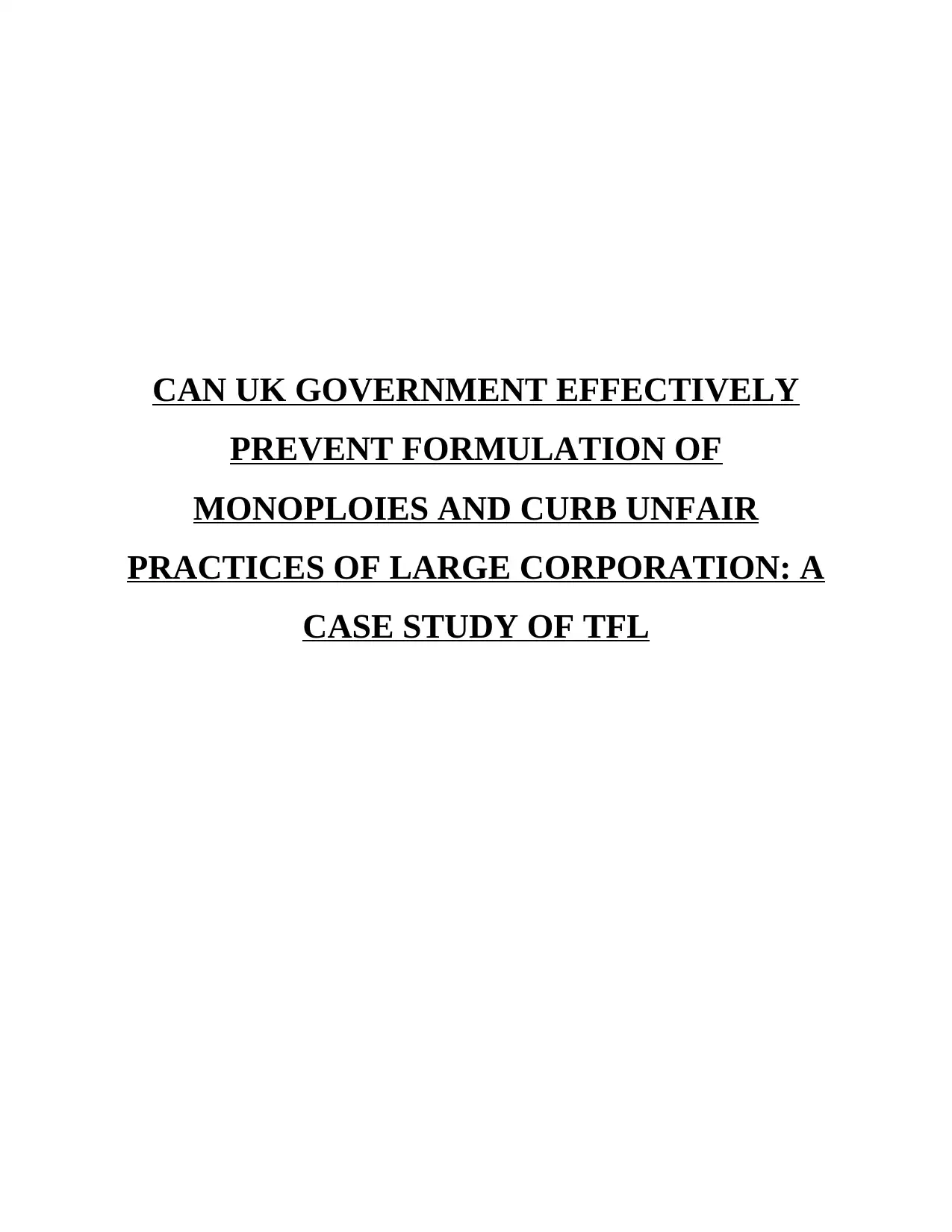
CAN UK GOVERNMENT EFFECTIVELY
PREVENT FORMULATION OF
MONOPLOIES AND CURB UNFAIR
PRACTICES OF LARGE CORPORATION: A
CASE STUDY OF TFL
PREVENT FORMULATION OF
MONOPLOIES AND CURB UNFAIR
PRACTICES OF LARGE CORPORATION: A
CASE STUDY OF TFL
Paraphrase This Document
Need a fresh take? Get an instant paraphrase of this document with our AI Paraphraser
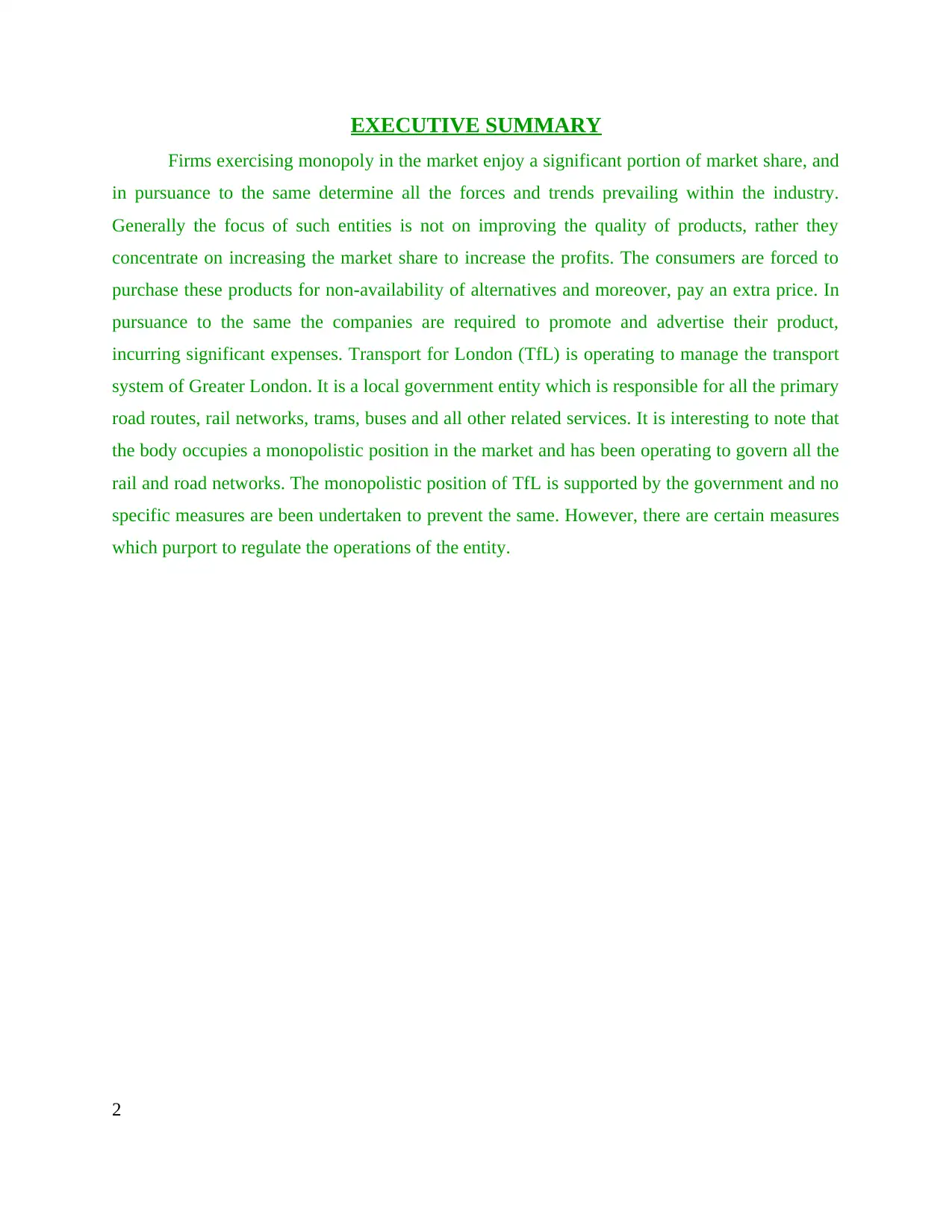
EXECUTIVE SUMMARY
Firms exercising monopoly in the market enjoy a significant portion of market share, and
in pursuance to the same determine all the forces and trends prevailing within the industry.
Generally the focus of such entities is not on improving the quality of products, rather they
concentrate on increasing the market share to increase the profits. The consumers are forced to
purchase these products for non-availability of alternatives and moreover, pay an extra price. In
pursuance to the same the companies are required to promote and advertise their product,
incurring significant expenses. Transport for London (TfL) is operating to manage the transport
system of Greater London. It is a local government entity which is responsible for all the primary
road routes, rail networks, trams, buses and all other related services. It is interesting to note that
the body occupies a monopolistic position in the market and has been operating to govern all the
rail and road networks. The monopolistic position of TfL is supported by the government and no
specific measures are been undertaken to prevent the same. However, there are certain measures
which purport to regulate the operations of the entity.
2
Firms exercising monopoly in the market enjoy a significant portion of market share, and
in pursuance to the same determine all the forces and trends prevailing within the industry.
Generally the focus of such entities is not on improving the quality of products, rather they
concentrate on increasing the market share to increase the profits. The consumers are forced to
purchase these products for non-availability of alternatives and moreover, pay an extra price. In
pursuance to the same the companies are required to promote and advertise their product,
incurring significant expenses. Transport for London (TfL) is operating to manage the transport
system of Greater London. It is a local government entity which is responsible for all the primary
road routes, rail networks, trams, buses and all other related services. It is interesting to note that
the body occupies a monopolistic position in the market and has been operating to govern all the
rail and road networks. The monopolistic position of TfL is supported by the government and no
specific measures are been undertaken to prevent the same. However, there are certain measures
which purport to regulate the operations of the entity.
2
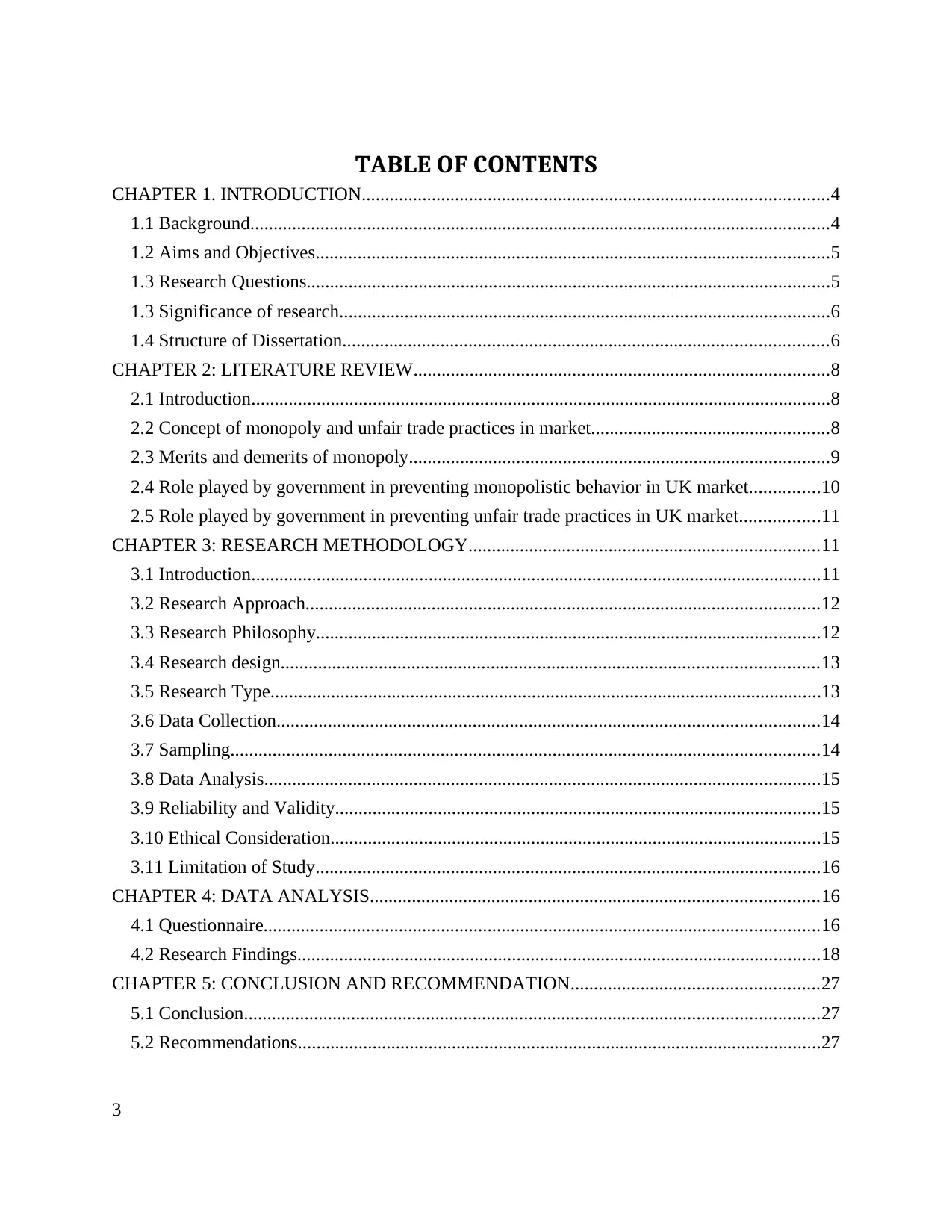
TABLE OF CONTENTS
CHAPTER 1. INTRODUCTION....................................................................................................4
1.1 Background............................................................................................................................4
1.2 Aims and Objectives..............................................................................................................5
1.3 Research Questions................................................................................................................5
1.3 Significance of research.........................................................................................................6
1.4 Structure of Dissertation........................................................................................................6
CHAPTER 2: LITERATURE REVIEW.........................................................................................8
2.1 Introduction............................................................................................................................8
2.2 Concept of monopoly and unfair trade practices in market...................................................8
2.3 Merits and demerits of monopoly..........................................................................................9
2.4 Role played by government in preventing monopolistic behavior in UK market...............10
2.5 Role played by government in preventing unfair trade practices in UK market.................11
CHAPTER 3: RESEARCH METHODOLOGY...........................................................................11
3.1 Introduction..........................................................................................................................11
3.2 Research Approach..............................................................................................................12
3.3 Research Philosophy............................................................................................................12
3.4 Research design...................................................................................................................13
3.5 Research Type......................................................................................................................13
3.6 Data Collection....................................................................................................................14
3.7 Sampling..............................................................................................................................14
3.8 Data Analysis.......................................................................................................................15
3.9 Reliability and Validity........................................................................................................15
3.10 Ethical Consideration.........................................................................................................15
3.11 Limitation of Study............................................................................................................16
CHAPTER 4: DATA ANALYSIS................................................................................................16
4.1 Questionnaire.......................................................................................................................16
4.2 Research Findings................................................................................................................18
CHAPTER 5: CONCLUSION AND RECOMMENDATION.....................................................27
5.1 Conclusion...........................................................................................................................27
5.2 Recommendations................................................................................................................27
3
CHAPTER 1. INTRODUCTION....................................................................................................4
1.1 Background............................................................................................................................4
1.2 Aims and Objectives..............................................................................................................5
1.3 Research Questions................................................................................................................5
1.3 Significance of research.........................................................................................................6
1.4 Structure of Dissertation........................................................................................................6
CHAPTER 2: LITERATURE REVIEW.........................................................................................8
2.1 Introduction............................................................................................................................8
2.2 Concept of monopoly and unfair trade practices in market...................................................8
2.3 Merits and demerits of monopoly..........................................................................................9
2.4 Role played by government in preventing monopolistic behavior in UK market...............10
2.5 Role played by government in preventing unfair trade practices in UK market.................11
CHAPTER 3: RESEARCH METHODOLOGY...........................................................................11
3.1 Introduction..........................................................................................................................11
3.2 Research Approach..............................................................................................................12
3.3 Research Philosophy............................................................................................................12
3.4 Research design...................................................................................................................13
3.5 Research Type......................................................................................................................13
3.6 Data Collection....................................................................................................................14
3.7 Sampling..............................................................................................................................14
3.8 Data Analysis.......................................................................................................................15
3.9 Reliability and Validity........................................................................................................15
3.10 Ethical Consideration.........................................................................................................15
3.11 Limitation of Study............................................................................................................16
CHAPTER 4: DATA ANALYSIS................................................................................................16
4.1 Questionnaire.......................................................................................................................16
4.2 Research Findings................................................................................................................18
CHAPTER 5: CONCLUSION AND RECOMMENDATION.....................................................27
5.1 Conclusion...........................................................................................................................27
5.2 Recommendations................................................................................................................27
3
⊘ This is a preview!⊘
Do you want full access?
Subscribe today to unlock all pages.

Trusted by 1+ million students worldwide
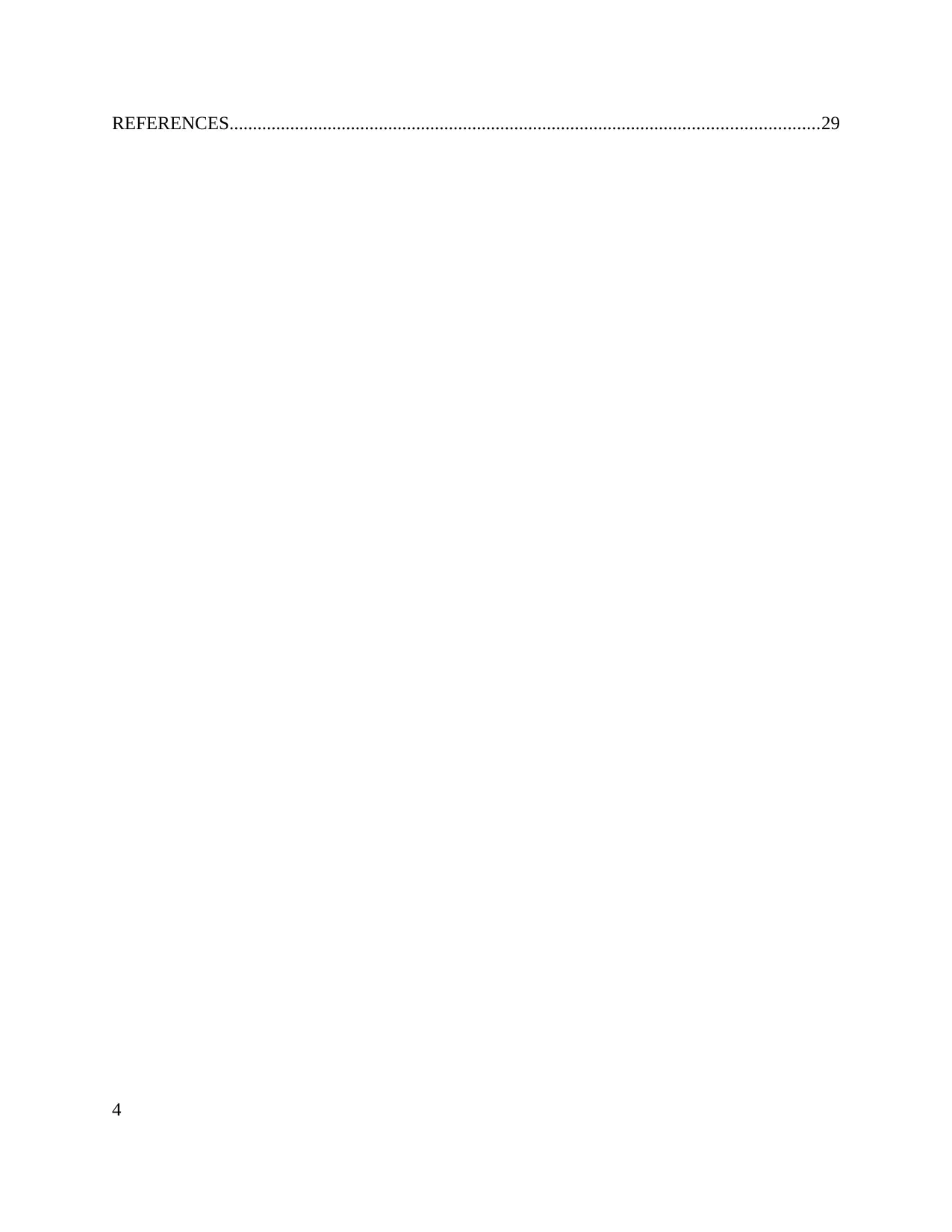
REFERENCES..............................................................................................................................29
4
4
Paraphrase This Document
Need a fresh take? Get an instant paraphrase of this document with our AI Paraphraser
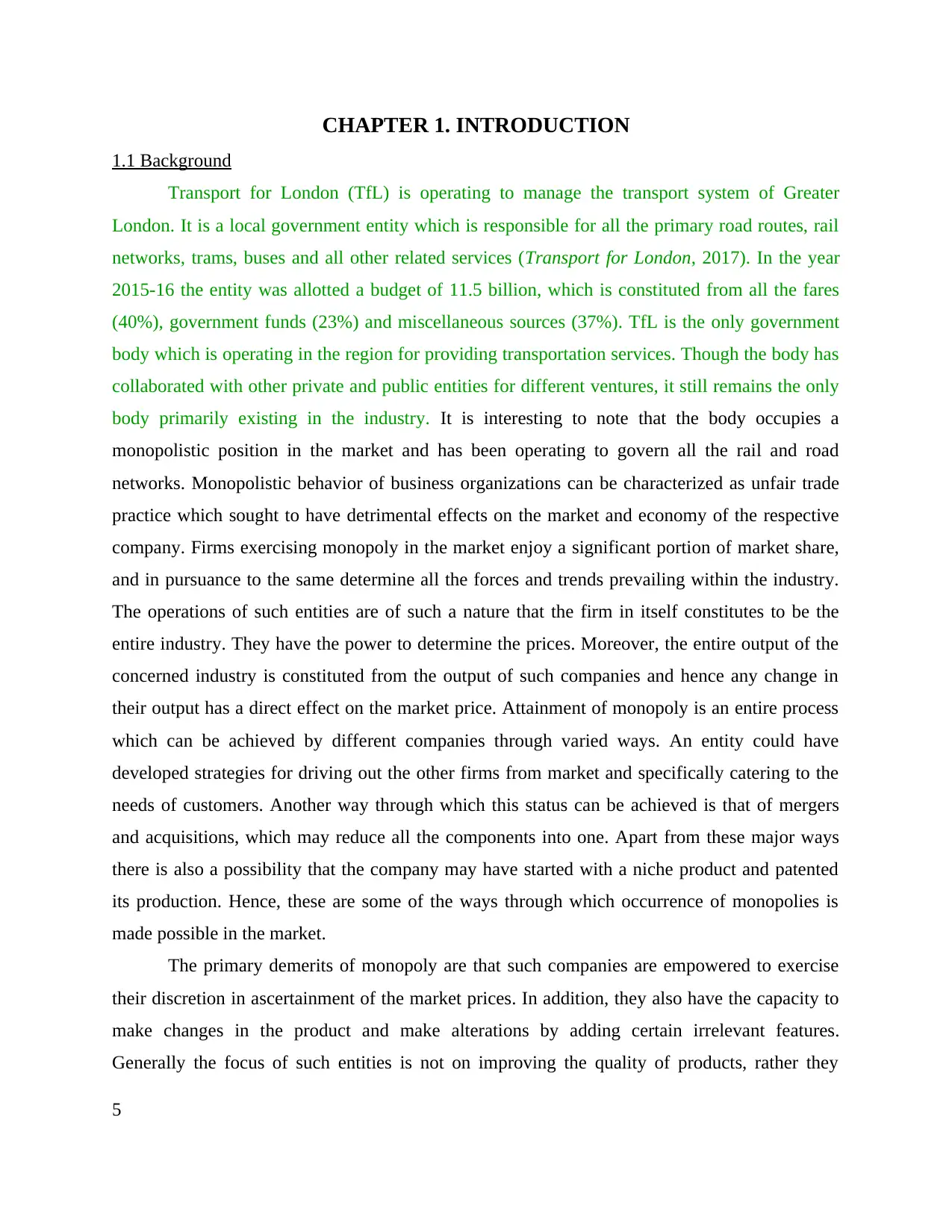
CHAPTER 1. INTRODUCTION
1.1 Background
Transport for London (TfL) is operating to manage the transport system of Greater
London. It is a local government entity which is responsible for all the primary road routes, rail
networks, trams, buses and all other related services (Transport for London, 2017). In the year
2015-16 the entity was allotted a budget of 11.5 billion, which is constituted from all the fares
(40%), government funds (23%) and miscellaneous sources (37%). TfL is the only government
body which is operating in the region for providing transportation services. Though the body has
collaborated with other private and public entities for different ventures, it still remains the only
body primarily existing in the industry. It is interesting to note that the body occupies a
monopolistic position in the market and has been operating to govern all the rail and road
networks. Monopolistic behavior of business organizations can be characterized as unfair trade
practice which sought to have detrimental effects on the market and economy of the respective
company. Firms exercising monopoly in the market enjoy a significant portion of market share,
and in pursuance to the same determine all the forces and trends prevailing within the industry.
The operations of such entities are of such a nature that the firm in itself constitutes to be the
entire industry. They have the power to determine the prices. Moreover, the entire output of the
concerned industry is constituted from the output of such companies and hence any change in
their output has a direct effect on the market price. Attainment of monopoly is an entire process
which can be achieved by different companies through varied ways. An entity could have
developed strategies for driving out the other firms from market and specifically catering to the
needs of customers. Another way through which this status can be achieved is that of mergers
and acquisitions, which may reduce all the components into one. Apart from these major ways
there is also a possibility that the company may have started with a niche product and patented
its production. Hence, these are some of the ways through which occurrence of monopolies is
made possible in the market.
The primary demerits of monopoly are that such companies are empowered to exercise
their discretion in ascertainment of the market prices. In addition, they also have the capacity to
make changes in the product and make alterations by adding certain irrelevant features.
Generally the focus of such entities is not on improving the quality of products, rather they
5
1.1 Background
Transport for London (TfL) is operating to manage the transport system of Greater
London. It is a local government entity which is responsible for all the primary road routes, rail
networks, trams, buses and all other related services (Transport for London, 2017). In the year
2015-16 the entity was allotted a budget of 11.5 billion, which is constituted from all the fares
(40%), government funds (23%) and miscellaneous sources (37%). TfL is the only government
body which is operating in the region for providing transportation services. Though the body has
collaborated with other private and public entities for different ventures, it still remains the only
body primarily existing in the industry. It is interesting to note that the body occupies a
monopolistic position in the market and has been operating to govern all the rail and road
networks. Monopolistic behavior of business organizations can be characterized as unfair trade
practice which sought to have detrimental effects on the market and economy of the respective
company. Firms exercising monopoly in the market enjoy a significant portion of market share,
and in pursuance to the same determine all the forces and trends prevailing within the industry.
The operations of such entities are of such a nature that the firm in itself constitutes to be the
entire industry. They have the power to determine the prices. Moreover, the entire output of the
concerned industry is constituted from the output of such companies and hence any change in
their output has a direct effect on the market price. Attainment of monopoly is an entire process
which can be achieved by different companies through varied ways. An entity could have
developed strategies for driving out the other firms from market and specifically catering to the
needs of customers. Another way through which this status can be achieved is that of mergers
and acquisitions, which may reduce all the components into one. Apart from these major ways
there is also a possibility that the company may have started with a niche product and patented
its production. Hence, these are some of the ways through which occurrence of monopolies is
made possible in the market.
The primary demerits of monopoly are that such companies are empowered to exercise
their discretion in ascertainment of the market prices. In addition, they also have the capacity to
make changes in the product and make alterations by adding certain irrelevant features.
Generally the focus of such entities is not on improving the quality of products, rather they
5
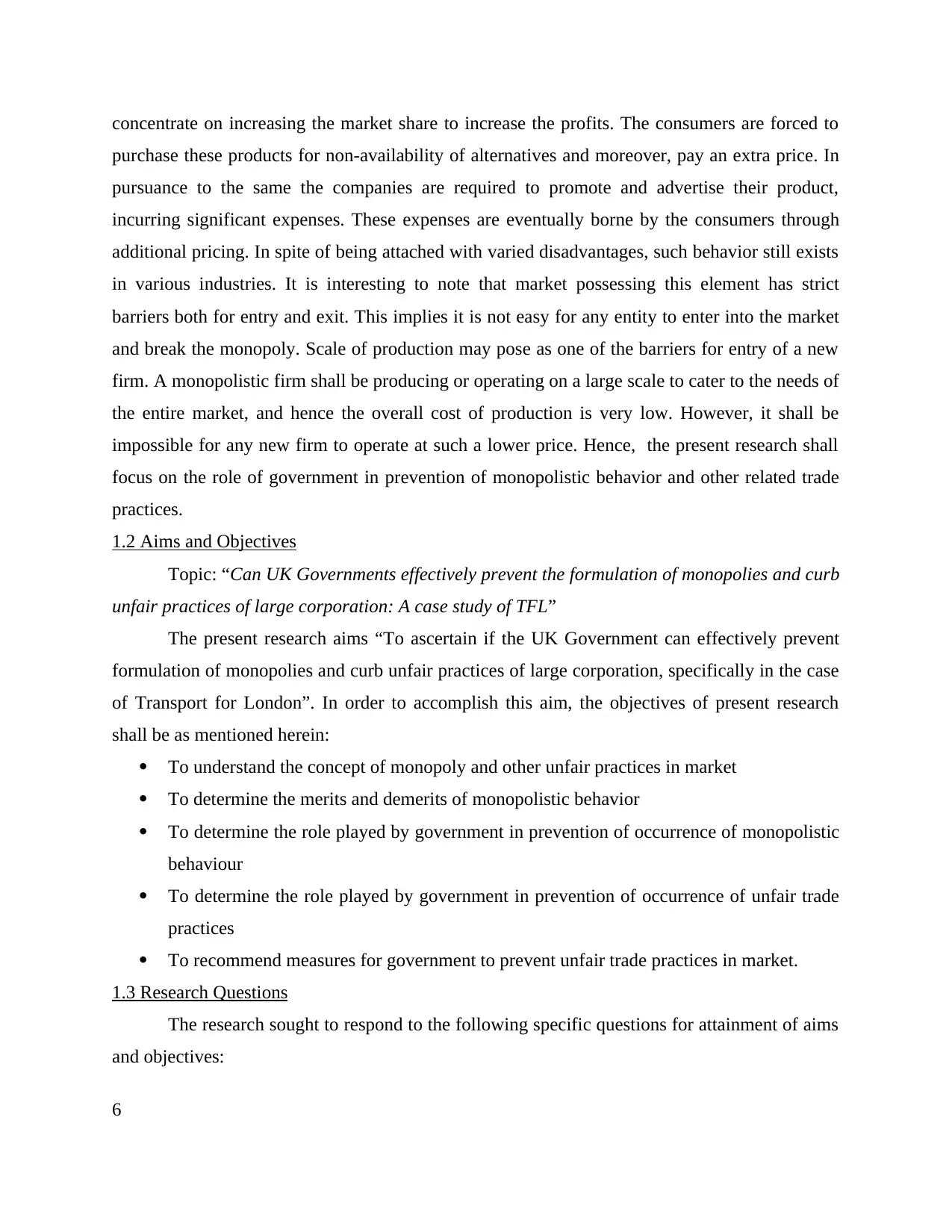
concentrate on increasing the market share to increase the profits. The consumers are forced to
purchase these products for non-availability of alternatives and moreover, pay an extra price. In
pursuance to the same the companies are required to promote and advertise their product,
incurring significant expenses. These expenses are eventually borne by the consumers through
additional pricing. In spite of being attached with varied disadvantages, such behavior still exists
in various industries. It is interesting to note that market possessing this element has strict
barriers both for entry and exit. This implies it is not easy for any entity to enter into the market
and break the monopoly. Scale of production may pose as one of the barriers for entry of a new
firm. A monopolistic firm shall be producing or operating on a large scale to cater to the needs of
the entire market, and hence the overall cost of production is very low. However, it shall be
impossible for any new firm to operate at such a lower price. Hence, the present research shall
focus on the role of government in prevention of monopolistic behavior and other related trade
practices.
1.2 Aims and Objectives
Topic: “Can UK Governments effectively prevent the formulation of monopolies and curb
unfair practices of large corporation: A case study of TFL”
The present research aims “To ascertain if the UK Government can effectively prevent
formulation of monopolies and curb unfair practices of large corporation, specifically in the case
of Transport for London”. In order to accomplish this aim, the objectives of present research
shall be as mentioned herein:
To understand the concept of monopoly and other unfair practices in market
To determine the merits and demerits of monopolistic behavior
To determine the role played by government in prevention of occurrence of monopolistic
behaviour
To determine the role played by government in prevention of occurrence of unfair trade
practices
To recommend measures for government to prevent unfair trade practices in market.
1.3 Research Questions
The research sought to respond to the following specific questions for attainment of aims
and objectives:
6
purchase these products for non-availability of alternatives and moreover, pay an extra price. In
pursuance to the same the companies are required to promote and advertise their product,
incurring significant expenses. These expenses are eventually borne by the consumers through
additional pricing. In spite of being attached with varied disadvantages, such behavior still exists
in various industries. It is interesting to note that market possessing this element has strict
barriers both for entry and exit. This implies it is not easy for any entity to enter into the market
and break the monopoly. Scale of production may pose as one of the barriers for entry of a new
firm. A monopolistic firm shall be producing or operating on a large scale to cater to the needs of
the entire market, and hence the overall cost of production is very low. However, it shall be
impossible for any new firm to operate at such a lower price. Hence, the present research shall
focus on the role of government in prevention of monopolistic behavior and other related trade
practices.
1.2 Aims and Objectives
Topic: “Can UK Governments effectively prevent the formulation of monopolies and curb
unfair practices of large corporation: A case study of TFL”
The present research aims “To ascertain if the UK Government can effectively prevent
formulation of monopolies and curb unfair practices of large corporation, specifically in the case
of Transport for London”. In order to accomplish this aim, the objectives of present research
shall be as mentioned herein:
To understand the concept of monopoly and other unfair practices in market
To determine the merits and demerits of monopolistic behavior
To determine the role played by government in prevention of occurrence of monopolistic
behaviour
To determine the role played by government in prevention of occurrence of unfair trade
practices
To recommend measures for government to prevent unfair trade practices in market.
1.3 Research Questions
The research sought to respond to the following specific questions for attainment of aims
and objectives:
6
⊘ This is a preview!⊘
Do you want full access?
Subscribe today to unlock all pages.

Trusted by 1+ million students worldwide
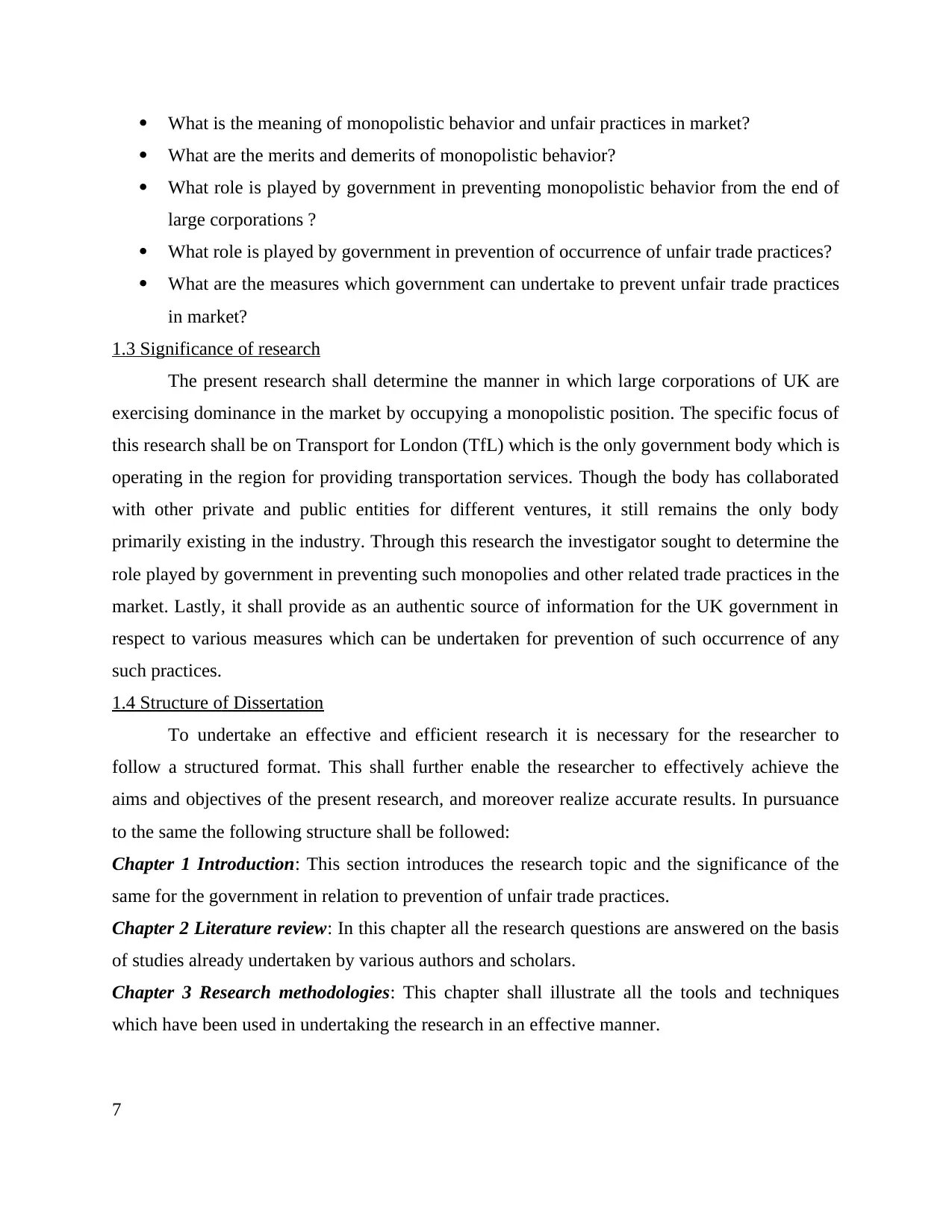
What is the meaning of monopolistic behavior and unfair practices in market?
What are the merits and demerits of monopolistic behavior?
What role is played by government in preventing monopolistic behavior from the end of
large corporations ?
What role is played by government in prevention of occurrence of unfair trade practices?
What are the measures which government can undertake to prevent unfair trade practices
in market?
1.3 Significance of research
The present research shall determine the manner in which large corporations of UK are
exercising dominance in the market by occupying a monopolistic position. The specific focus of
this research shall be on Transport for London (TfL) which is the only government body which is
operating in the region for providing transportation services. Though the body has collaborated
with other private and public entities for different ventures, it still remains the only body
primarily existing in the industry. Through this research the investigator sought to determine the
role played by government in preventing such monopolies and other related trade practices in the
market. Lastly, it shall provide as an authentic source of information for the UK government in
respect to various measures which can be undertaken for prevention of such occurrence of any
such practices.
1.4 Structure of Dissertation
To undertake an effective and efficient research it is necessary for the researcher to
follow a structured format. This shall further enable the researcher to effectively achieve the
aims and objectives of the present research, and moreover realize accurate results. In pursuance
to the same the following structure shall be followed:
Chapter 1 Introduction: This section introduces the research topic and the significance of the
same for the government in relation to prevention of unfair trade practices.
Chapter 2 Literature review: In this chapter all the research questions are answered on the basis
of studies already undertaken by various authors and scholars.
Chapter 3 Research methodologies: This chapter shall illustrate all the tools and techniques
which have been used in undertaking the research in an effective manner.
7
What are the merits and demerits of monopolistic behavior?
What role is played by government in preventing monopolistic behavior from the end of
large corporations ?
What role is played by government in prevention of occurrence of unfair trade practices?
What are the measures which government can undertake to prevent unfair trade practices
in market?
1.3 Significance of research
The present research shall determine the manner in which large corporations of UK are
exercising dominance in the market by occupying a monopolistic position. The specific focus of
this research shall be on Transport for London (TfL) which is the only government body which is
operating in the region for providing transportation services. Though the body has collaborated
with other private and public entities for different ventures, it still remains the only body
primarily existing in the industry. Through this research the investigator sought to determine the
role played by government in preventing such monopolies and other related trade practices in the
market. Lastly, it shall provide as an authentic source of information for the UK government in
respect to various measures which can be undertaken for prevention of such occurrence of any
such practices.
1.4 Structure of Dissertation
To undertake an effective and efficient research it is necessary for the researcher to
follow a structured format. This shall further enable the researcher to effectively achieve the
aims and objectives of the present research, and moreover realize accurate results. In pursuance
to the same the following structure shall be followed:
Chapter 1 Introduction: This section introduces the research topic and the significance of the
same for the government in relation to prevention of unfair trade practices.
Chapter 2 Literature review: In this chapter all the research questions are answered on the basis
of studies already undertaken by various authors and scholars.
Chapter 3 Research methodologies: This chapter shall illustrate all the tools and techniques
which have been used in undertaking the research in an effective manner.
7
Paraphrase This Document
Need a fresh take? Get an instant paraphrase of this document with our AI Paraphraser
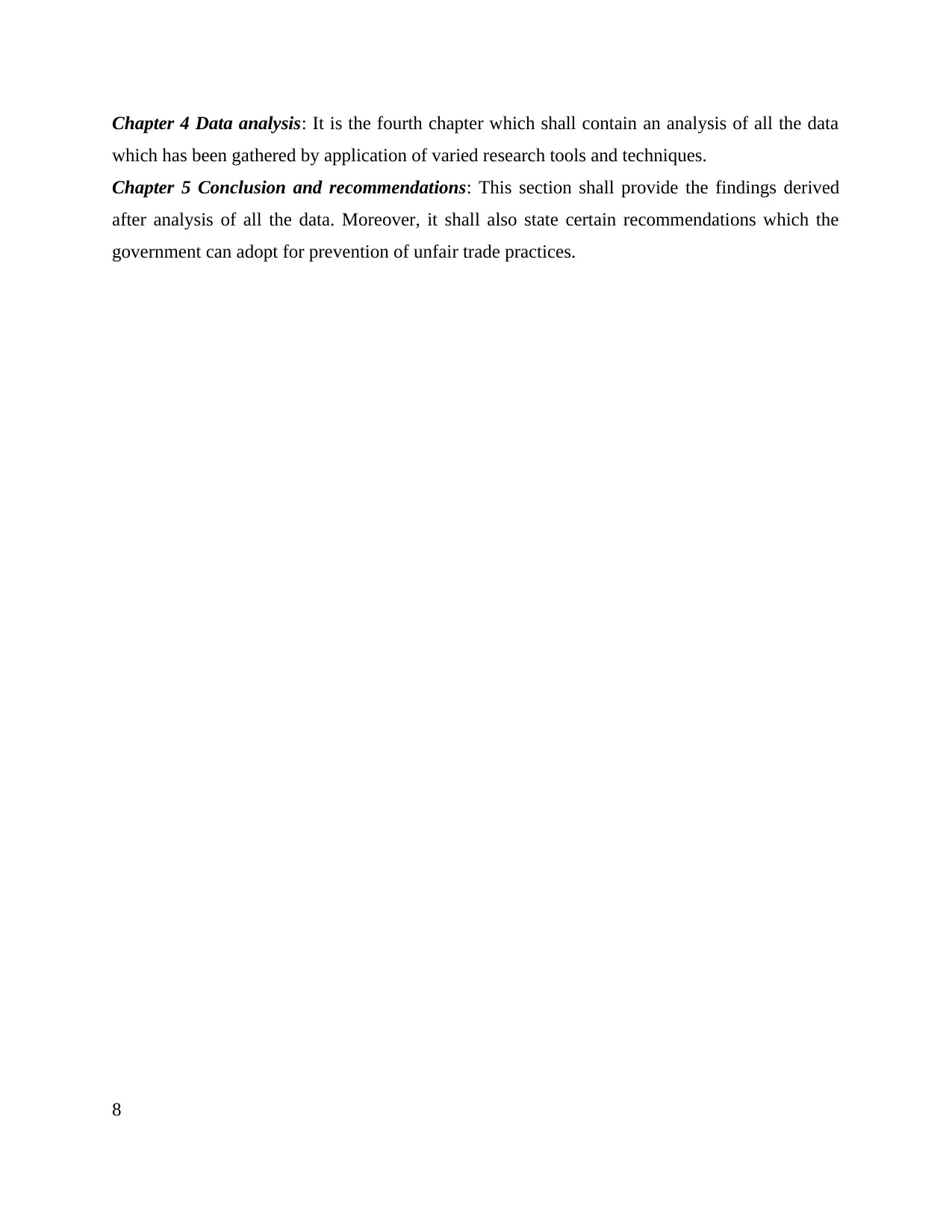
Chapter 4 Data analysis: It is the fourth chapter which shall contain an analysis of all the data
which has been gathered by application of varied research tools and techniques.
Chapter 5 Conclusion and recommendations: This section shall provide the findings derived
after analysis of all the data. Moreover, it shall also state certain recommendations which the
government can adopt for prevention of unfair trade practices.
8
which has been gathered by application of varied research tools and techniques.
Chapter 5 Conclusion and recommendations: This section shall provide the findings derived
after analysis of all the data. Moreover, it shall also state certain recommendations which the
government can adopt for prevention of unfair trade practices.
8
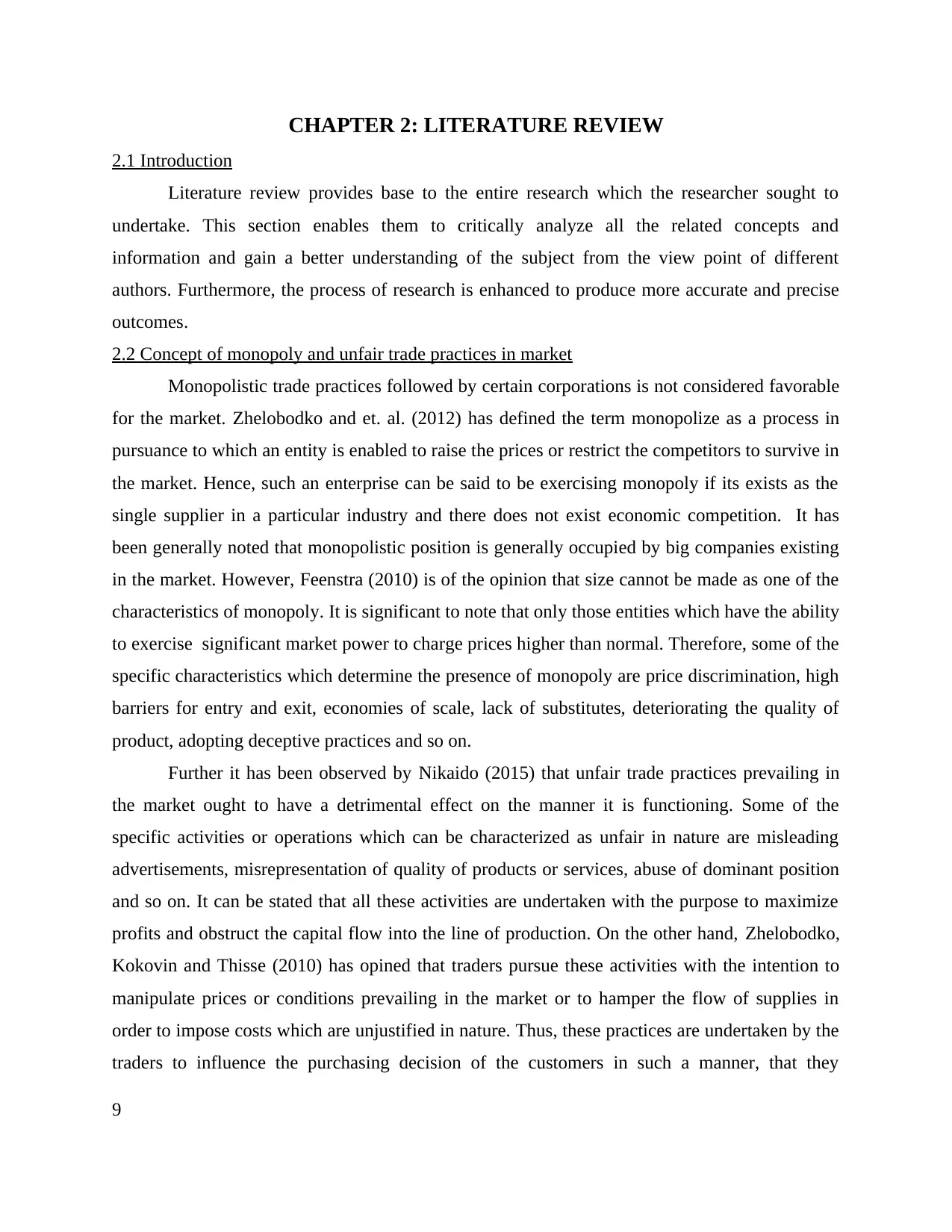
CHAPTER 2: LITERATURE REVIEW
2.1 Introduction
Literature review provides base to the entire research which the researcher sought to
undertake. This section enables them to critically analyze all the related concepts and
information and gain a better understanding of the subject from the view point of different
authors. Furthermore, the process of research is enhanced to produce more accurate and precise
outcomes.
2.2 Concept of monopoly and unfair trade practices in market
Monopolistic trade practices followed by certain corporations is not considered favorable
for the market. Zhelobodko and et. al. (2012) has defined the term monopolize as a process in
pursuance to which an entity is enabled to raise the prices or restrict the competitors to survive in
the market. Hence, such an enterprise can be said to be exercising monopoly if its exists as the
single supplier in a particular industry and there does not exist economic competition. It has
been generally noted that monopolistic position is generally occupied by big companies existing
in the market. However, Feenstra (2010) is of the opinion that size cannot be made as one of the
characteristics of monopoly. It is significant to note that only those entities which have the ability
to exercise significant market power to charge prices higher than normal. Therefore, some of the
specific characteristics which determine the presence of monopoly are price discrimination, high
barriers for entry and exit, economies of scale, lack of substitutes, deteriorating the quality of
product, adopting deceptive practices and so on.
Further it has been observed by Nikaido (2015) that unfair trade practices prevailing in
the market ought to have a detrimental effect on the manner it is functioning. Some of the
specific activities or operations which can be characterized as unfair in nature are misleading
advertisements, misrepresentation of quality of products or services, abuse of dominant position
and so on. It can be stated that all these activities are undertaken with the purpose to maximize
profits and obstruct the capital flow into the line of production. On the other hand, Zhelobodko,
Kokovin and Thisse (2010) has opined that traders pursue these activities with the intention to
manipulate prices or conditions prevailing in the market or to hamper the flow of supplies in
order to impose costs which are unjustified in nature. Thus, these practices are undertaken by the
traders to influence the purchasing decision of the customers in such a manner, that they
9
2.1 Introduction
Literature review provides base to the entire research which the researcher sought to
undertake. This section enables them to critically analyze all the related concepts and
information and gain a better understanding of the subject from the view point of different
authors. Furthermore, the process of research is enhanced to produce more accurate and precise
outcomes.
2.2 Concept of monopoly and unfair trade practices in market
Monopolistic trade practices followed by certain corporations is not considered favorable
for the market. Zhelobodko and et. al. (2012) has defined the term monopolize as a process in
pursuance to which an entity is enabled to raise the prices or restrict the competitors to survive in
the market. Hence, such an enterprise can be said to be exercising monopoly if its exists as the
single supplier in a particular industry and there does not exist economic competition. It has
been generally noted that monopolistic position is generally occupied by big companies existing
in the market. However, Feenstra (2010) is of the opinion that size cannot be made as one of the
characteristics of monopoly. It is significant to note that only those entities which have the ability
to exercise significant market power to charge prices higher than normal. Therefore, some of the
specific characteristics which determine the presence of monopoly are price discrimination, high
barriers for entry and exit, economies of scale, lack of substitutes, deteriorating the quality of
product, adopting deceptive practices and so on.
Further it has been observed by Nikaido (2015) that unfair trade practices prevailing in
the market ought to have a detrimental effect on the manner it is functioning. Some of the
specific activities or operations which can be characterized as unfair in nature are misleading
advertisements, misrepresentation of quality of products or services, abuse of dominant position
and so on. It can be stated that all these activities are undertaken with the purpose to maximize
profits and obstruct the capital flow into the line of production. On the other hand, Zhelobodko,
Kokovin and Thisse (2010) has opined that traders pursue these activities with the intention to
manipulate prices or conditions prevailing in the market or to hamper the flow of supplies in
order to impose costs which are unjustified in nature. Thus, these practices are undertaken by the
traders to influence the purchasing decision of the customers in such a manner, that they
9
⊘ This is a preview!⊘
Do you want full access?
Subscribe today to unlock all pages.

Trusted by 1+ million students worldwide
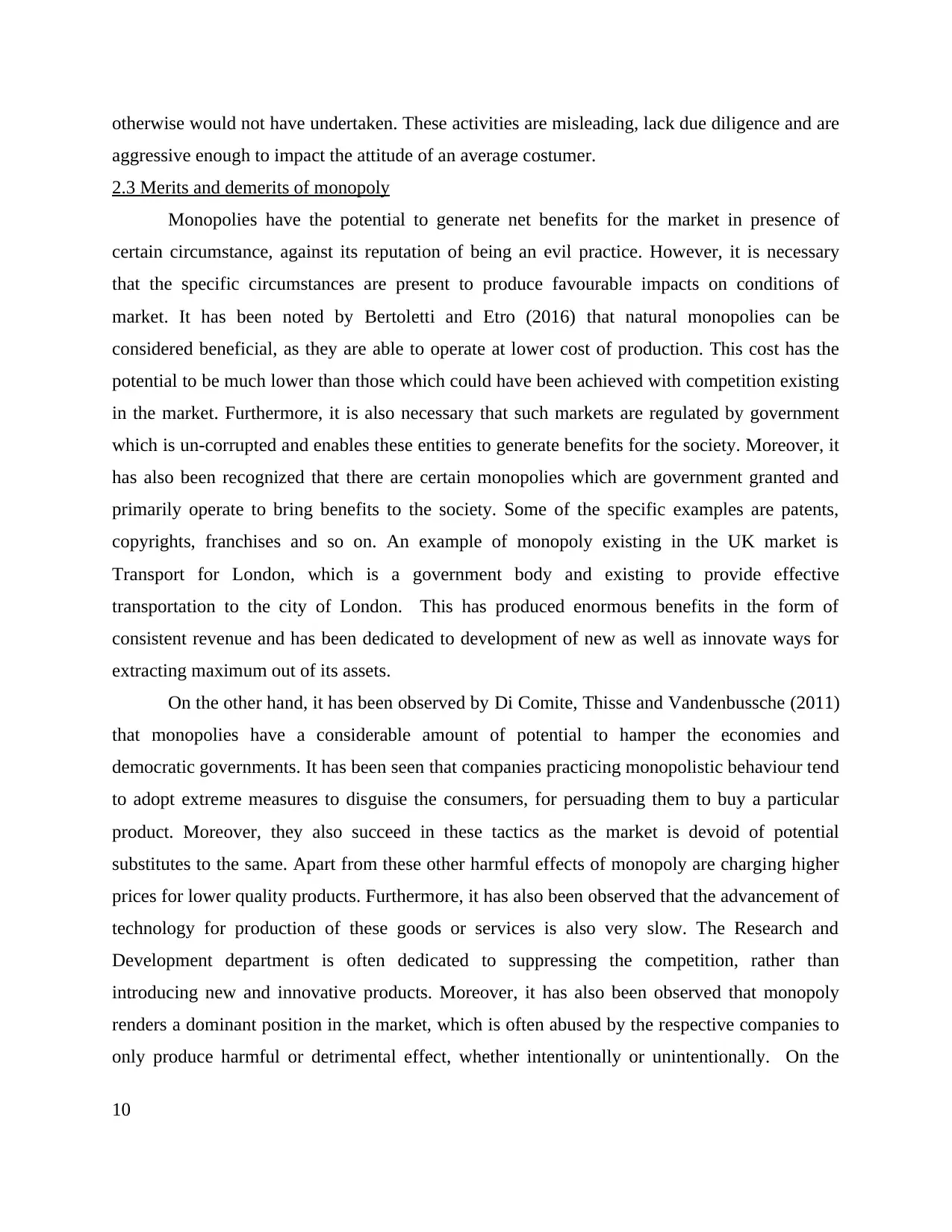
otherwise would not have undertaken. These activities are misleading, lack due diligence and are
aggressive enough to impact the attitude of an average costumer.
2.3 Merits and demerits of monopoly
Monopolies have the potential to generate net benefits for the market in presence of
certain circumstance, against its reputation of being an evil practice. However, it is necessary
that the specific circumstances are present to produce favourable impacts on conditions of
market. It has been noted by Bertoletti and Etro (2016) that natural monopolies can be
considered beneficial, as they are able to operate at lower cost of production. This cost has the
potential to be much lower than those which could have been achieved with competition existing
in the market. Furthermore, it is also necessary that such markets are regulated by government
which is un-corrupted and enables these entities to generate benefits for the society. Moreover, it
has also been recognized that there are certain monopolies which are government granted and
primarily operate to bring benefits to the society. Some of the specific examples are patents,
copyrights, franchises and so on. An example of monopoly existing in the UK market is
Transport for London, which is a government body and existing to provide effective
transportation to the city of London. This has produced enormous benefits in the form of
consistent revenue and has been dedicated to development of new as well as innovate ways for
extracting maximum out of its assets.
On the other hand, it has been observed by Di Comite, Thisse and Vandenbussche (2011)
that monopolies have a considerable amount of potential to hamper the economies and
democratic governments. It has been seen that companies practicing monopolistic behaviour tend
to adopt extreme measures to disguise the consumers, for persuading them to buy a particular
product. Moreover, they also succeed in these tactics as the market is devoid of potential
substitutes to the same. Apart from these other harmful effects of monopoly are charging higher
prices for lower quality products. Furthermore, it has also been observed that the advancement of
technology for production of these goods or services is also very slow. The Research and
Development department is often dedicated to suppressing the competition, rather than
introducing new and innovative products. Moreover, it has also been observed that monopoly
renders a dominant position in the market, which is often abused by the respective companies to
only produce harmful or detrimental effect, whether intentionally or unintentionally. On the
10
aggressive enough to impact the attitude of an average costumer.
2.3 Merits and demerits of monopoly
Monopolies have the potential to generate net benefits for the market in presence of
certain circumstance, against its reputation of being an evil practice. However, it is necessary
that the specific circumstances are present to produce favourable impacts on conditions of
market. It has been noted by Bertoletti and Etro (2016) that natural monopolies can be
considered beneficial, as they are able to operate at lower cost of production. This cost has the
potential to be much lower than those which could have been achieved with competition existing
in the market. Furthermore, it is also necessary that such markets are regulated by government
which is un-corrupted and enables these entities to generate benefits for the society. Moreover, it
has also been recognized that there are certain monopolies which are government granted and
primarily operate to bring benefits to the society. Some of the specific examples are patents,
copyrights, franchises and so on. An example of monopoly existing in the UK market is
Transport for London, which is a government body and existing to provide effective
transportation to the city of London. This has produced enormous benefits in the form of
consistent revenue and has been dedicated to development of new as well as innovate ways for
extracting maximum out of its assets.
On the other hand, it has been observed by Di Comite, Thisse and Vandenbussche (2011)
that monopolies have a considerable amount of potential to hamper the economies and
democratic governments. It has been seen that companies practicing monopolistic behaviour tend
to adopt extreme measures to disguise the consumers, for persuading them to buy a particular
product. Moreover, they also succeed in these tactics as the market is devoid of potential
substitutes to the same. Apart from these other harmful effects of monopoly are charging higher
prices for lower quality products. Furthermore, it has also been observed that the advancement of
technology for production of these goods or services is also very slow. The Research and
Development department is often dedicated to suppressing the competition, rather than
introducing new and innovative products. Moreover, it has also been observed that monopoly
renders a dominant position in the market, which is often abused by the respective companies to
only produce harmful or detrimental effect, whether intentionally or unintentionally. On the
10
Paraphrase This Document
Need a fresh take? Get an instant paraphrase of this document with our AI Paraphraser
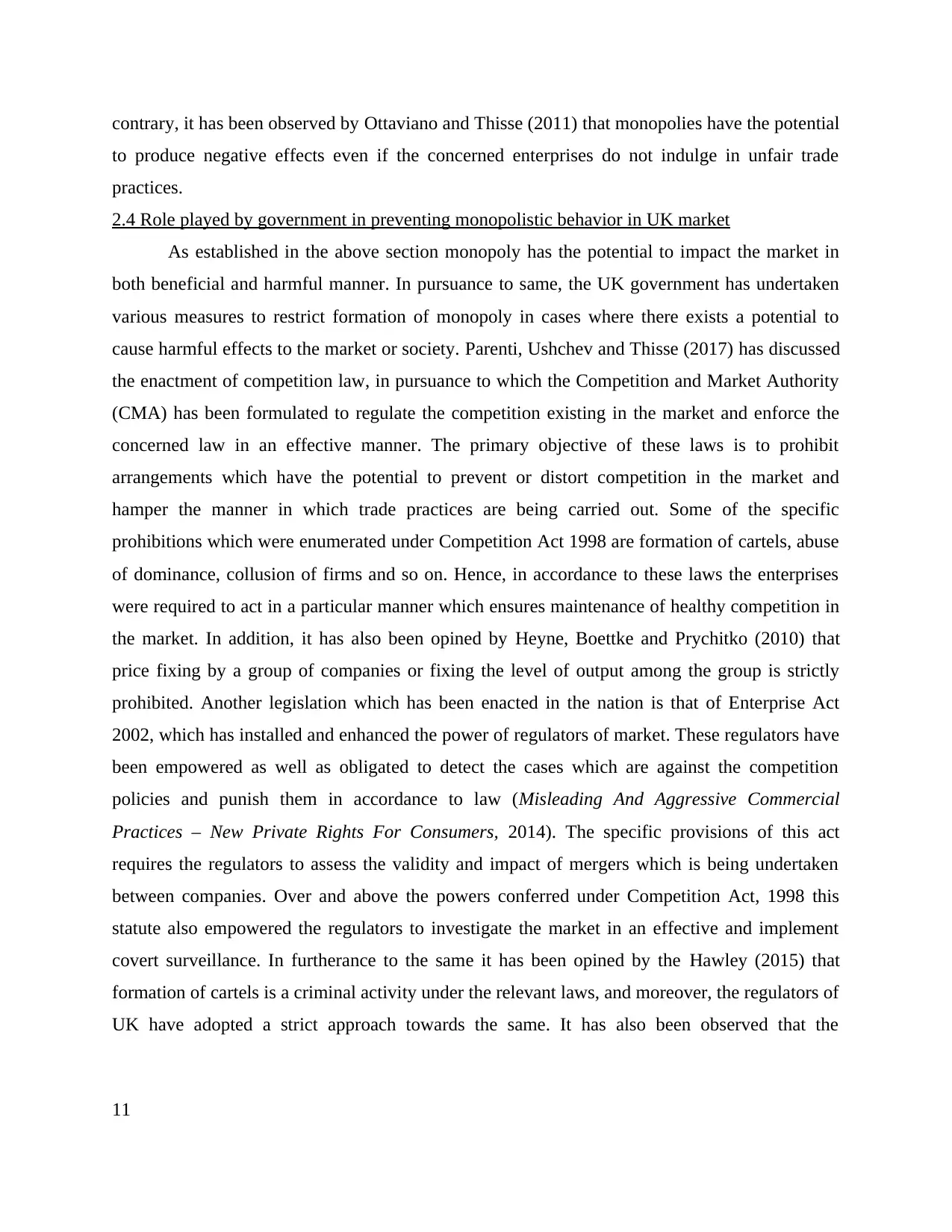
contrary, it has been observed by Ottaviano and Thisse (2011) that monopolies have the potential
to produce negative effects even if the concerned enterprises do not indulge in unfair trade
practices.
2.4 Role played by government in preventing monopolistic behavior in UK market
As established in the above section monopoly has the potential to impact the market in
both beneficial and harmful manner. In pursuance to same, the UK government has undertaken
various measures to restrict formation of monopoly in cases where there exists a potential to
cause harmful effects to the market or society. Parenti, Ushchev and Thisse (2017) has discussed
the enactment of competition law, in pursuance to which the Competition and Market Authority
(CMA) has been formulated to regulate the competition existing in the market and enforce the
concerned law in an effective manner. The primary objective of these laws is to prohibit
arrangements which have the potential to prevent or distort competition in the market and
hamper the manner in which trade practices are being carried out. Some of the specific
prohibitions which were enumerated under Competition Act 1998 are formation of cartels, abuse
of dominance, collusion of firms and so on. Hence, in accordance to these laws the enterprises
were required to act in a particular manner which ensures maintenance of healthy competition in
the market. In addition, it has also been opined by Heyne, Boettke and Prychitko (2010) that
price fixing by a group of companies or fixing the level of output among the group is strictly
prohibited. Another legislation which has been enacted in the nation is that of Enterprise Act
2002, which has installed and enhanced the power of regulators of market. These regulators have
been empowered as well as obligated to detect the cases which are against the competition
policies and punish them in accordance to law (Misleading And Aggressive Commercial
Practices – New Private Rights For Consumers, 2014). The specific provisions of this act
requires the regulators to assess the validity and impact of mergers which is being undertaken
between companies. Over and above the powers conferred under Competition Act, 1998 this
statute also empowered the regulators to investigate the market in an effective and implement
covert surveillance. In furtherance to the same it has been opined by the Hawley (2015) that
formation of cartels is a criminal activity under the relevant laws, and moreover, the regulators of
UK have adopted a strict approach towards the same. It has also been observed that the
11
to produce negative effects even if the concerned enterprises do not indulge in unfair trade
practices.
2.4 Role played by government in preventing monopolistic behavior in UK market
As established in the above section monopoly has the potential to impact the market in
both beneficial and harmful manner. In pursuance to same, the UK government has undertaken
various measures to restrict formation of monopoly in cases where there exists a potential to
cause harmful effects to the market or society. Parenti, Ushchev and Thisse (2017) has discussed
the enactment of competition law, in pursuance to which the Competition and Market Authority
(CMA) has been formulated to regulate the competition existing in the market and enforce the
concerned law in an effective manner. The primary objective of these laws is to prohibit
arrangements which have the potential to prevent or distort competition in the market and
hamper the manner in which trade practices are being carried out. Some of the specific
prohibitions which were enumerated under Competition Act 1998 are formation of cartels, abuse
of dominance, collusion of firms and so on. Hence, in accordance to these laws the enterprises
were required to act in a particular manner which ensures maintenance of healthy competition in
the market. In addition, it has also been opined by Heyne, Boettke and Prychitko (2010) that
price fixing by a group of companies or fixing the level of output among the group is strictly
prohibited. Another legislation which has been enacted in the nation is that of Enterprise Act
2002, which has installed and enhanced the power of regulators of market. These regulators have
been empowered as well as obligated to detect the cases which are against the competition
policies and punish them in accordance to law (Misleading And Aggressive Commercial
Practices – New Private Rights For Consumers, 2014). The specific provisions of this act
requires the regulators to assess the validity and impact of mergers which is being undertaken
between companies. Over and above the powers conferred under Competition Act, 1998 this
statute also empowered the regulators to investigate the market in an effective and implement
covert surveillance. In furtherance to the same it has been opined by the Hawley (2015) that
formation of cartels is a criminal activity under the relevant laws, and moreover, the regulators of
UK have adopted a strict approach towards the same. It has also been observed that the
11
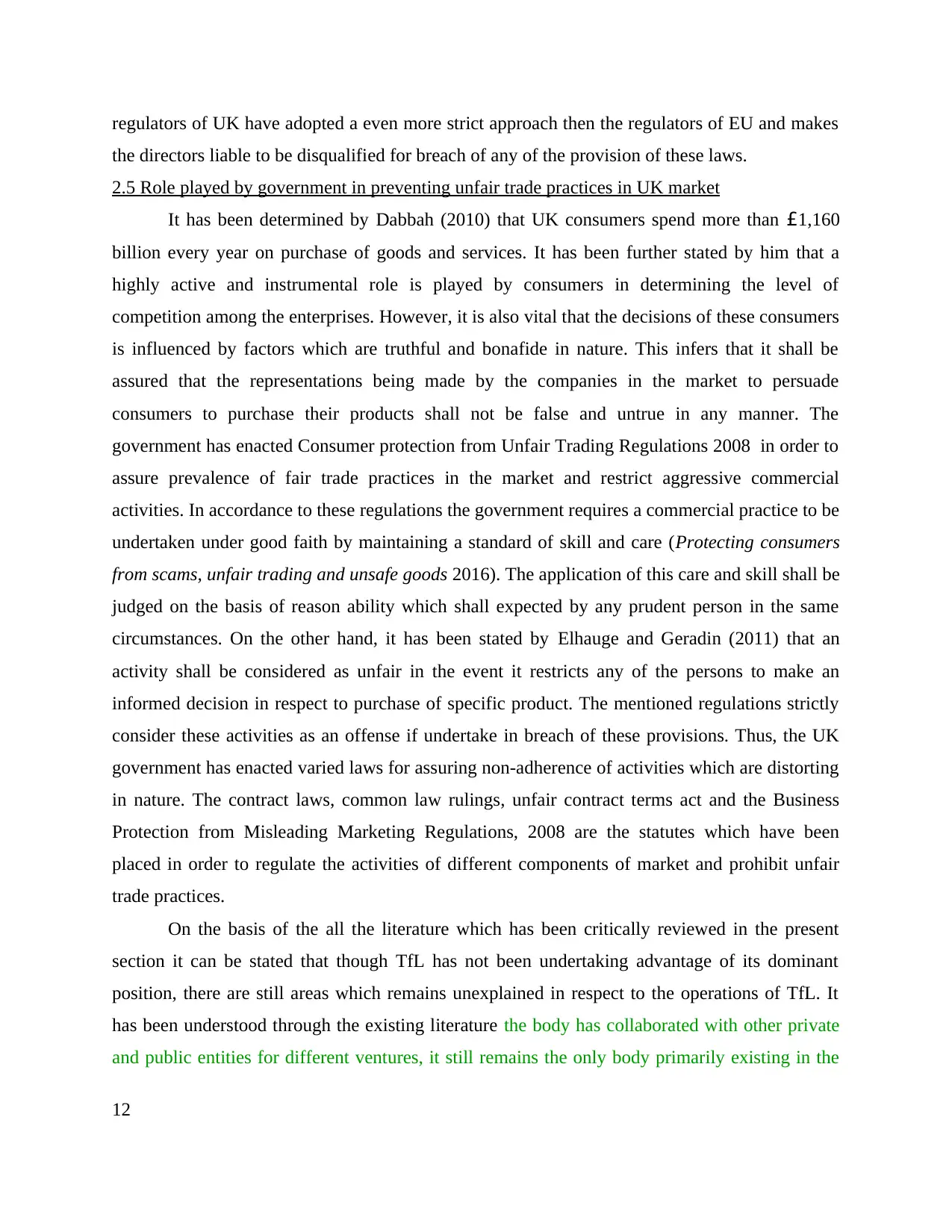
regulators of UK have adopted a even more strict approach then the regulators of EU and makes
the directors liable to be disqualified for breach of any of the provision of these laws.
2.5 Role played by government in preventing unfair trade practices in UK market
It has been determined by Dabbah (2010) that UK consumers spend more than £1,160
billion every year on purchase of goods and services. It has been further stated by him that a
highly active and instrumental role is played by consumers in determining the level of
competition among the enterprises. However, it is also vital that the decisions of these consumers
is influenced by factors which are truthful and bonafide in nature. This infers that it shall be
assured that the representations being made by the companies in the market to persuade
consumers to purchase their products shall not be false and untrue in any manner. The
government has enacted Consumer protection from Unfair Trading Regulations 2008 in order to
assure prevalence of fair trade practices in the market and restrict aggressive commercial
activities. In accordance to these regulations the government requires a commercial practice to be
undertaken under good faith by maintaining a standard of skill and care (Protecting consumers
from scams, unfair trading and unsafe goods 2016). The application of this care and skill shall be
judged on the basis of reason ability which shall expected by any prudent person in the same
circumstances. On the other hand, it has been stated by Elhauge and Geradin (2011) that an
activity shall be considered as unfair in the event it restricts any of the persons to make an
informed decision in respect to purchase of specific product. The mentioned regulations strictly
consider these activities as an offense if undertake in breach of these provisions. Thus, the UK
government has enacted varied laws for assuring non-adherence of activities which are distorting
in nature. The contract laws, common law rulings, unfair contract terms act and the Business
Protection from Misleading Marketing Regulations, 2008 are the statutes which have been
placed in order to regulate the activities of different components of market and prohibit unfair
trade practices.
On the basis of the all the literature which has been critically reviewed in the present
section it can be stated that though TfL has not been undertaking advantage of its dominant
position, there are still areas which remains unexplained in respect to the operations of TfL. It
has been understood through the existing literature the body has collaborated with other private
and public entities for different ventures, it still remains the only body primarily existing in the
12
the directors liable to be disqualified for breach of any of the provision of these laws.
2.5 Role played by government in preventing unfair trade practices in UK market
It has been determined by Dabbah (2010) that UK consumers spend more than £1,160
billion every year on purchase of goods and services. It has been further stated by him that a
highly active and instrumental role is played by consumers in determining the level of
competition among the enterprises. However, it is also vital that the decisions of these consumers
is influenced by factors which are truthful and bonafide in nature. This infers that it shall be
assured that the representations being made by the companies in the market to persuade
consumers to purchase their products shall not be false and untrue in any manner. The
government has enacted Consumer protection from Unfair Trading Regulations 2008 in order to
assure prevalence of fair trade practices in the market and restrict aggressive commercial
activities. In accordance to these regulations the government requires a commercial practice to be
undertaken under good faith by maintaining a standard of skill and care (Protecting consumers
from scams, unfair trading and unsafe goods 2016). The application of this care and skill shall be
judged on the basis of reason ability which shall expected by any prudent person in the same
circumstances. On the other hand, it has been stated by Elhauge and Geradin (2011) that an
activity shall be considered as unfair in the event it restricts any of the persons to make an
informed decision in respect to purchase of specific product. The mentioned regulations strictly
consider these activities as an offense if undertake in breach of these provisions. Thus, the UK
government has enacted varied laws for assuring non-adherence of activities which are distorting
in nature. The contract laws, common law rulings, unfair contract terms act and the Business
Protection from Misleading Marketing Regulations, 2008 are the statutes which have been
placed in order to regulate the activities of different components of market and prohibit unfair
trade practices.
On the basis of the all the literature which has been critically reviewed in the present
section it can be stated that though TfL has not been undertaking advantage of its dominant
position, there are still areas which remains unexplained in respect to the operations of TfL. It
has been understood through the existing literature the body has collaborated with other private
and public entities for different ventures, it still remains the only body primarily existing in the
12
⊘ This is a preview!⊘
Do you want full access?
Subscribe today to unlock all pages.

Trusted by 1+ million students worldwide
1 out of 32
Related Documents
Your All-in-One AI-Powered Toolkit for Academic Success.
+13062052269
info@desklib.com
Available 24*7 on WhatsApp / Email
![[object Object]](/_next/static/media/star-bottom.7253800d.svg)
Unlock your academic potential
Copyright © 2020–2025 A2Z Services. All Rights Reserved. Developed and managed by ZUCOL.



